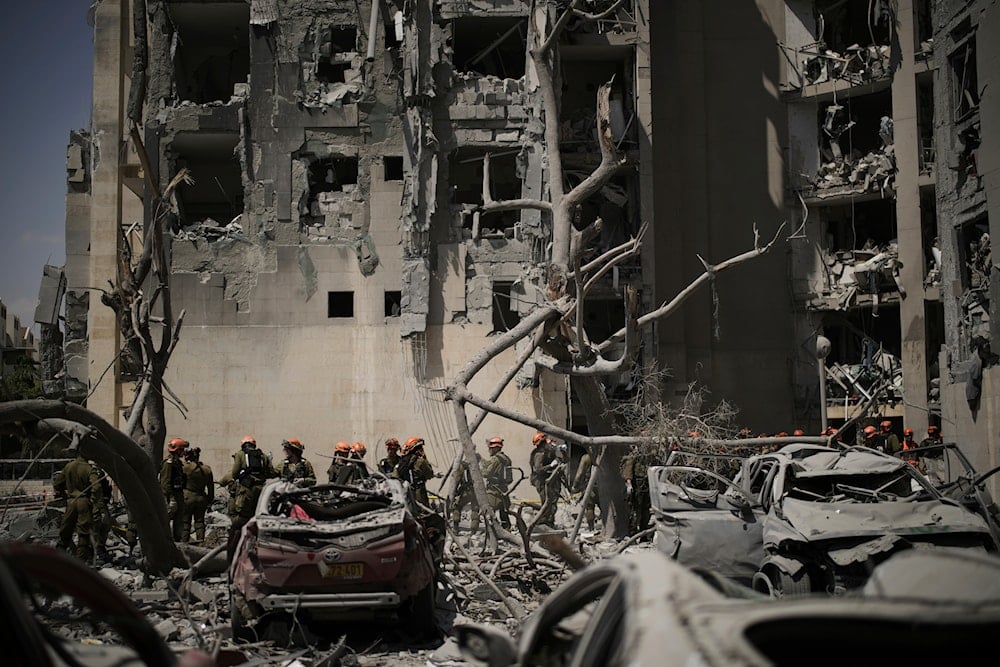'Israel' begged US to end war after military setbacks: Iran
Iran’s Defense Ministry said "Israel’s" miscalculations backfired, leaving its military infrastructure heavily damaged in the recent war.
-

Israeli soldiers from the Home Front Command unit work at the site struck by an Iranian missile strike that killed several people, in Beersheba, occupied Palestine, on June 24, 2025. (AP Photo/Leo Correa)
Iran’s Defense Ministry spokesperson, Brigadier General Reza Talaei-Nik, declared on Sunday that “Israel” had pleaded for a ceasefire in the recent war, one it initiated in an effort to divide Iran and weaken its national power.
According to Talaei-Nik, "the Zionist regime turned to the US government to stop the war and save itself." He stressed that “the enemy’s miscalculations came at a steep price, as ‘Israel’s’ military infrastructure was struck hard.”
In a similar vein, Iran’s defense minister has issued a warning to adversaries, stressing that the country possesses advanced military hardware yet to be revealed on any battlefield, which could be deployed in the event of renewed aggression.
Brigadier General Aziz Nasirzadeh made the remarks in a televised interview on Friday, emphasizing that Iran is prepared to escalate its defense measures if provoked. "If the enemy resorts to another aggression, we will certainly deploy equipment that has not been deployed yet," Nasirzadeh stated.
The minister referred to the Qasem Basir missile as one of the weapons withheld during the recent 12-day Israeli aggression on Iran. The solid-fuel missile, with a range of 1,200 kilometers, was described as "virtually our surgical missile with the highest level of precision."
Nasirzadeh noted that the missile’s development drew on expertise gained from previous retaliatory operations, including the True Promise 1 and 2 operations, adding that the projectile is designed to resist electronic warfare and electromagnetic countermeasures, ensuring accuracy in hitting its targets.
He also revealed that Iran has successfully tested maneuverable missiles capable of deviating from conventional ballistic trajectories, making them more difficult for enemy defense systems to intercept. These weapons, he said, were not employed during the June war.
Iran says 'Israel' could not sustain a longer war
Reflecting on the recent 12-day war with “Israel,” Nasirzadeh suggested that prolonging the war would have left the enemy increasingly vulnerable, adding: "If the war had lasted 15 days, in the final three days, the enemy might not have been able to defend itself against any of our missiles."
He also pointed out the unsustainable financial cost for adversaries trying to counter Iran’s missile salvos. Systems such as Patriot and THAAD require expensive interceptors, he said, and once their stockpiles are depleted, reloading becomes a slow process. According to Nasirzadeh, this imbalance forced the Israeli entity to request a ceasefire within less than two weeks.
Operation True Promise 3 showcased Iran’s expanding missile and drone arsenal. According to the Islamic Revolution Guard Corps (IRGC), Iran launched more than 2,000 missiles and drones during the 12-day confrontation, while relying on only about a quarter of its total missile capacity.
Among the advanced systems deployed was the Sejjil ballistic missile, with a range of up to 2,500 kilometers and high-precision guidance, and the Fattah-1 hypersonic missile, capable of traveling at speeds of up to Mach 15. Iran also introduced the Kheibar (Qadr H) multi-warhead missile and fielded heavy Khorramshahr missiles carrying 1.5-ton warheads.
During the war, Iranian strikes targeted Israeli military bases, logistics centers, and intelligence sites, including the Tel Nof air base. Damages from the strikes were estimated at $3 billion.
Despite the extensive assault, Iranian commanders stressed that Tehran withheld its most destructive capabilities. Senior officials hinted at “major surprises” that remain undisclosed, underscoring that Iran retains a substantial strategic reserve for any future war.
Recent Iranian statements on future confrontation
In recent weeks, senior Iranian officials have reiterated that the ceasefire with "Israel" was only temporary and that a stronger response awaits if “Israel” or the US launches new aggression.
On August 17, Yahya Rahim Safavi, senior advisor to Iranian leader Sayyed Ali Khamenei, declared that Iran is “not in a ceasefire, but in a stage of war.” He warned that another clash could prove decisive, stating, “Another war may happen, and after that, there may be no more wars.”
Echoing this view, Major General Majid Mousavi, commander of the IRGC Aerospace Force, described Iran’s state of readiness as “an ever-repeating Ashura,” underlining the need for continuous preparation. Similarly, Ali Larijani, Secretary of the Supreme National Security Council, stressed that “the war with Israel is not over” and characterized the current calm as merely “a war paused by a ceasefire.”

 4 Min Read
4 Min Read










